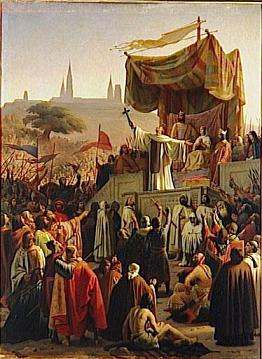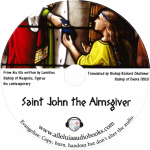Saint Bernard the Wonderworker : More Miracles on St Bernards Journey
Click Here to Download the Entire AudioBook on St Bernard the Wonderworker.
Transcript
St. Bernard spent the remainder of this memorable year at Spires, and did not resume his journey till the 4th of January, 1141. At his departure, the emperor, the princes, and the numerous battalions of Crusaders, crowded around him to hear his words for the last tune, and to pay him their last homage. The sacred orator addressed to them a touching exhortation; “and his words,” says the historian, ” are not human, but divine.” The brilliant train set forth, advancing with difficulty on account of the immense crowd which poured through the streets and along the road. Suddenly a poor, crippled child threw himself before the saint, and asked his blessing ; at the same moment this child arose, perfectly cured. At the sight of this miracle, the emperor, who was riding at the side of the saint, and the whole astonished crowd, sent forth their acclamations of surprise, blessing the wonder-working saint ; but he, drawing back from all this homage, turned towards Conrad, and said to him; ” It is on your account that this cure has been worked, that you may know that God is with you, and that your undertaking is pleasing to Him.”
In all the cities through which the servant of God passed, he renewed his preaching and his miracles ; but the edification he gave was nowhere greater than at Cologne. He knew the impatience of this city to receive him; and in order to escape the honors which they were preparing for him, he made his entrance secretly, in the evening. But “glory pursued him who fled from it;” and the news of his arrival had hardly spread through the city, when the inhabitants flocked in crowds to his dwelling, and testified their tumultuous rejoicing throughout the whole night.” The crowd was so close and so intolerable” says one of his disciples, “that the holy abbot could not go out of his house. He remained at a window, from which he blessed the people; and it was only by means of a ladder placed in the street that they were able to present to his notice the sick, whom he restored to health. They dared not open the doors on account of the multitude which besieged the entrance. “As to myself,” says the monk Gerard, “being desirous of entering the house, I could not do so in any way; and from nine in the morning till evening, I remained in the street, without being able to reach either the door or the ladder, so completely was every avenue stopped up.” The writer abandons the attempt to enumerate the number of miracles which took place at Cologne during the four days (from the 9th to the 12th of January) they remained in the city. On the Sunday, St. Bernard celebrated Mass in the Cathedral to satisfy the wishes of all, he preached in the market place, where his discourses electrified the multitude.
Wonderful cures distinguished this day, A woman who had lost her reason through the bitter grief she had felt at the death of her husband, was brought to him, and regained, on touching the holy man of God, her senses, and her power of mind. Another woman, subject to nervous convulsions, received her health at the moment he blessed her with the holy sign of the cross. A woman of quality who, from the age of fifteen, had been deprived of the use of an eye, had lost all hope of recovery, after having vainly tried every kind of remedy; she recommended herself to the servant of God, and regained her sight. Fourteen other cures are named in the journal as having taken place on the same day, ” and these miracles,” says one of the secretaries, “were not done in the dark, but in full day, in public, before the whole world, that all the world might glorify God, who is wonderful in his saints. But these sudden cures were but the smallest portion of the wonders which the servant of God performed in a less visible manner. He displayed, indeed, all the plenitude of the power which Jesus Christ gave to His apostles of casting out evil spirits and healing every sickness and infirmity; but his miracles, like those of the apostles, as also those of Jesus Christ himself, always contained something symbolical, and were but the visible signs of another species of miracle, of an operation more interior, more mysterious, which was accomplished in the soul. The conversion of hearts, the triumph of light over darkness, of peace over vengeance, of justice over iniquity, of Christian piety over stupid indifference; such were the great effects arising from his indefatigable instructions . The inveterate evils which had, for a long time, destroyed public morals, had produced a blindness, a deafness, a fatal paralysis far more fatal than any physical evil ; and it was to these deep wounds that he applied all the unction of his words. Hence arose the disposition which characterized a great number of the Crusaders. The lively and vehement reaction which they manifested in favor of the holy war, arose from the deep want ever experienced by the spirit of penance; for true penitence always feels itself irresistibly drawn towards some work of expiation” this warlike enterprise, so suited to the temper of the multitude, and to the popular impetuosity, could not have the same attraction for certain tender souls which, having returned to God, felt themselves drawn to an interior life, and yearned for more peaceful labors —” for a life of recollection and of prayer these souls attached themselves more closely to St. Bernard, and in the neighborhood of Cologne alone, there were, without reckoning women, nearly sixty who abandoned the world, most of whom retired to Clairvaux.
The Abbot of Clauraux, accompanied by an always increasing number of his disciples, went from Cologne to Julers, thence to Aix-la-Chapelle, where he celebrated the holy mysteries in the Chapel of Charlemagne “Aix,” says the Chaplain Eberhard, with great naivete, ” is an agreeable abode ; but more so for the senses than for the soul. The prosperity of the merchants is their death; and woe to the undisciplined house! I say not this for their ruin, but for their amendment, if at any time some of them should read these words; and, would to God, that but one among them might be converted and live.” The same narrator relates the following fact, which happened at Aix-la-Chapelle : “We were at the altar of the Blessed Virgin, and I attended upon the reverend father, when a young girl was presented to him; he blessed her, and she was healed; but the crowd was so great, that we were obliged to retire.”
We will quote a few more instances from the journal of the travellers :
” Gerard. — Today the miracles seem to have been re- doubled. The crowd follows us everywhere, and the fields are as full as the towns. A mother brought a great girl, who had been deaf and dumb from her birth. The charitable father imposed his hands on her, and instantly, in our presence, she obtained both her hearing and speech. We had scarcely proceeded a few steps, when a man, quite as deaf, was suddenly healed.
Godfrey. — Until the occurrence of this miracle, I was before him, and preceded the crowd ; but, struck with the exclamations which every moment resounded behind me, I made careful inquiries concerning all which had happened, and I ascertained the fact that, on this one day, our holy father had healed, on the road, one blind girl, three deaf persons, one cripple, and, after that, five blind men.
Abbot Campigbus. — When we arrived in the evening at Juliers, a city which owed its origin to Julius Caesar, we found a crippled woman prostrate on the steps of the church. The saint, moved with compassion, took her by the hand, and raised her, with so much the more ease, on account of her great faith.
Gerard. — This morning, after the celebration of Mass, a woman of considerable importance, the niece of the Count of Juliers, who was entirely deprived of the use of one eye, and could see very little with the other, so that she could not walk without a guide, was instantaneously healed, by the simple sign of the cross. This miracle, like the others, was the subject of public rejoicing; and the people incessantly cried out, “Christ uns gnade !’ “Christe eleison!”’ During the whole route, at Maestricht, at Liege, Mons, Yalenciennes, Cambray, and Vaucelles, innumerable miracles gave token of the passing of the man of God. On leaving Liege, a young man, blind from his birth , was presented to him. ‘His eyes were not only sightless,^ say two of the chroniclers, but they were dried up, and the lids close shut. The saint opened them, touched them with his venerable fingers, and immediately restored their sight. The happy young man, at seeing the light, which he had never known, felt an extraordinary emotion. ‘I see,* cried he, “I see light, I see men, and I see creatures with hair.” Then he clapped his hands, and, jumping for joy, exclaimed, “O my God, now I shall never again hurt my feet against the stones. “
But Bernard, notwithstanding the desire which continnally urged him to go back to his cloister, thought that he ought to stay some days in Flanders, where he knew, like St. Paul at Ephesus, that a great door was opened to him. The words which he addressed to the population of this province had not the Crusade alone for the object ; they were principally directed to morals and doctrine, which the new heretics took pains to pervert. The man of God erected a Wall against the enemies of the Church ; and casting his net into the stream of the age, he drew forth an abundant draught of men, of letters and noble personages. Amongst the latter the annalist of Clairvaux relates a conversion, the edifying circumstances of which claim a place here.
Arnulph of Majorca was one of the most wealthy and highly-esteemed nobles of his province. He was living in pleasure and magnificence, when, on St. Bernard’s journey, he listened to a sermon which caused the veil to fall from his eyes. Touched with grace, and penetrated even to the depths of his soul, he resolved immediately, in imitation of the apostles, to quit his house, his relatives, his country, and to follow Jesus Christ. But his family was numerous ; his sons and his brothers, his fortune and the honor of his house, claimed his presence. He thought it best, therefore, to conceal his design till a favorable time, and not confide to anyone, not even to St. Bernard, the secret of his conscience. Time rolled on, and Arnulph, instead of disengaging himself from his worldly ties, engaged himself still more deeply in them, until one day he saw a poor shepherd arrive at his door, who threw himself at his feet, saying to him : “My lord, I pray you, by the love of Jesus Christ, to take me to Clairvaux to save my soul and yours.” The noble Arnulph, struck by this mysterious event, could no longer resist the voice which urged him, and, arranging his affairs, he set off for Clairvaux with the shepherd whom God had sent to him. He there found the saint, and revealed to him, with an effusion of tears, the iniquities of a long life. But, to his great surprise, the man of God, after having exhorted him to persevere in the Order of Citeaux, only imposed on him, as a penance, a triple recital of the Lord’s prayer. ” What, O most charitable father,” exclaimed the penitent, “do you not take seriously the conversion of so unworthy a sinner Assuredly, ten years of fasting and mortification would not suffice for expiation of my crimes, and you only give me three Paters.” The saint replied, ” Do you think you know, better than I do, what is needful for you?” ” God forbid that I should be so presumptuous,” replied Arnulph ; ” but I entreat you not to spare me in this world, that I may find my happiness in the future life.” “Do as I bid you,” replied the father, “and do it with confidence; and, when you shall have laid down the burden of the flesh, you shall ascend to God without any other.” The tone of inspiration and authority with which he spoke, calmed the conscience of Arnulph, and gained him profound peace. But, soon after, this soldier of God fell sick of an inflammation in the bowels ; and the illness made such rapid progress, that the holy oils were administered to him. Amidst his greatest sufferings, and when the sick man seemed ready to die, he was heard to cry out suddenly, ” Lord Jesus, yes, all Thy words are true;” he repeated these words so often, that one of the assistants attributed it to delirium. ” No, no,” cried the dying man, ” what I feel is not delirium; but I attest, with my whole heart, that every word of the Lord Jesus is infallibly accomplished. He has promised in His Gospel, to those who renounce all things to follow Him, a hundredfold in this world, and eternal life in the world to come. Well, I feel at this moment the truth of these words ; the spiritual consolations which I experience surpass, a hundredfold, all the joys of the world which I have left.” After saying these words, he fell asleep, sweetly and peacefully, in the Lord. Thus were the words of the holy abbot accomplished, “When you shall have laid down the burden of the flesh, you shall depart to God without any other.”
Download MP3 of St Bernard the Wonder Worker: More Miracles on St Bernards Journey (Right Click and Select Save As)
Click Here to Go Back To the AudioBook Page
Click here to make a novena to St Bernard
Credits
Saint Bernard the wonder worker, excerpts from the Life and Times of Saint Bernard by Abbot Theodore Ratisbonne and Heroic Virtue: A Portion of the Treatise of Benedict XIV on the Beatification and Canonization of the Servants of God Volume III.
You may also like:
- Saint Bernard the Wonderworker: Part 5 Miracles at Christmastide
- Saint Bernard the Wonderworker: Part 4 The Crusades and St Bernard
- Saint Bernard the Wonderworker: Part 3 More Miracles in Milan
- Saint Bernard the Wonderworker: Part 2 The Labors of Saint Bernard in Milan
- Saint Bernard the Wonderworker: Part 1 Early Miracles of St Bernard.
- Catholic Audiobook: St. Bernard the Wonderworker
- Catholic Audiobook: The Betrayel Of Judas and The Denial of Peter






